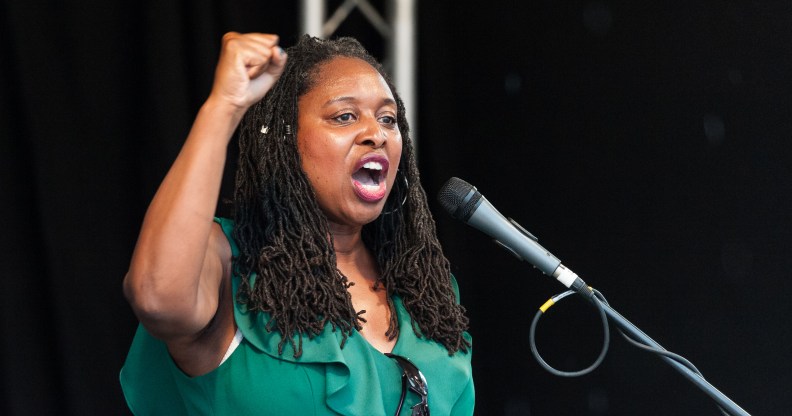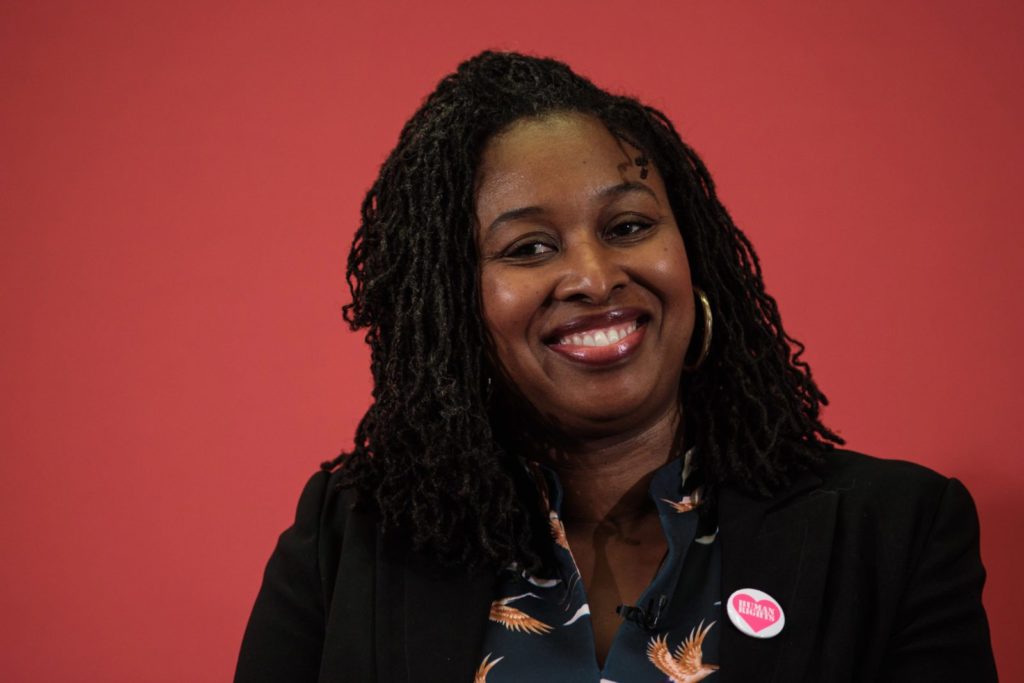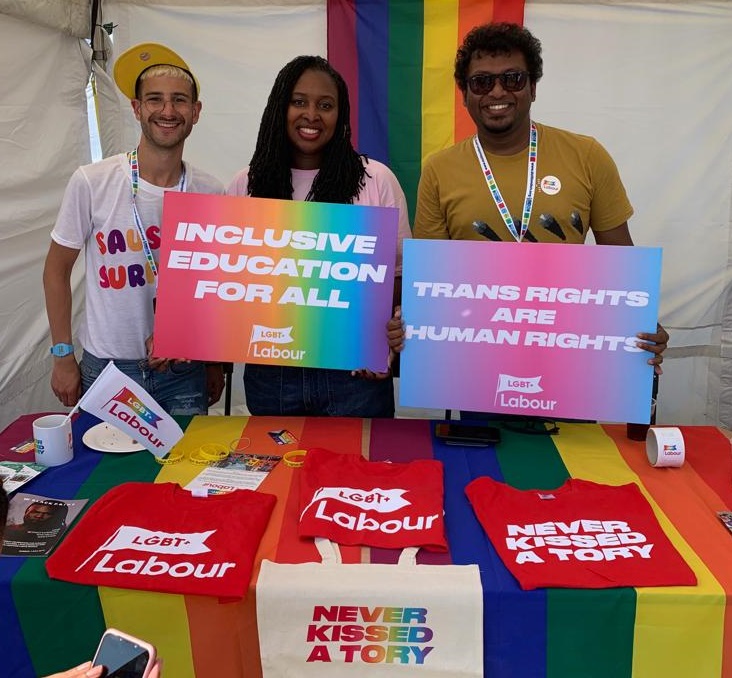Labour’s Dawn Butler vows to build a world where transphobia is a thing of the past

Dawn Butler addresses Labour Party members and supporters during a rally in Parliament Square calling for a general election, July 2019 (WIktor Szymanowicz/NurPhoto/ Getty)
Labour’s shadow women and equalities secretary, Dawn Butler, is one of the LGBT’s community’s fiercest allies in parliament.
She used her platform at the 2019 PinkNews Awards to deliver a powerful and rousing speech in condemnation of the continuing delays to reform of the Gender Recognition Act, declaring: “Who gives a s**t? Just amend the act already.”
Today, on the Transgender Day of Remembrance, she pledges to help build a world where transphobia is a thing of the past, and tells PinkNews readers that Labour is declaring “time’s up” on the GRA delays.

(Jack Taylor/Getty)
Dawn Butler, shadow women and equalities secretary.
As we mark the 20th Transgender Day of Remembrance, another 330 trans people have been reported killed in the last year, and the true figure is likely to be much higher.
In the UK in 2018/19 there were 2,333 reported hate crimes against transgender people or people who were perceived to be transgender, an increase of 37 per cent on the previous year.
These figures cannot describe the human tragedies contained within them. Nor do they describe the pain and fear that trans people are forced to live with simply for existing; for trying to live in a way that is honest and true to who they are.
As Labour’s shadow women and equalities secretary I want to be very clear; trans women are women, trans men are men, and trans people deserve unconditional solidarity and support for their right to exist in the gender with which they identify.
It is critical for politicians to show leadership on this issue in a particularly grim period, with some in public life mobilising to use trans people as a punch bag. The kind of rhetoric used by many in the media and politics who should know better has contributed directly to the climate of fear and violence which trans people face.
At the beginning of this general election a Downing Street insider suggested that Boris Johnson’s team were polling trans issues to see if they could be weaponised against Labour. Johnson’s office deny these claims, but their public record is little better.

At the 2019 PinkNews Awards Butler called out Baroness Williams for saying that GRA reform is “contentious.” (Paul Grace)
In early 2016, a government select committee chaired by the then Conservative MP Maria Miller released a report recommending changes to the Gender Recognition Act 2004 (GRA).
It recommended a simple system of self-identification to replace the current needlessly medicalised, difficult and demeaning process which costs more than other administrative applications such as obtaining a passport. In July 2017, the government launched a survey to gather more information about the experiences of LGBT+ people in the UK.
The survey response was unprecedented – more than 108,000 people participated, making it the largest national survey of LGBT+ people in the world to date. Then they decided to do another consultation which closed in 2018 and since then nothing has happened.
I wrote to women and equalities minister Liz Truss in October calling on the government to publish the results of the consultation. But the government’s refusal to include GRA reform in the Queen’s Speech means that people must still supply a medical diagnosis of gender dysphoria and two years’ worth of evidence that they have lived as that gender in order to be recognised.
In reality, NHS patients struggle to gather such proof and the process of jumping through hoops simply institutionalises trans people’s struggle to be recognised. Meanwhile waiting lists for gender reassignment surgery are prohibitively long.
The measure of a decent society is how we treat the most marginalised and disenfranchised, and so the physical and mental harm that trans people endure today is a reflection of the kind of society we live in
Two in five trans people have experienced a hate crime or incident because of their gender in the last year, adding to the pressure is irresponsible and dangerous.
This government has done nothing to combat the transphobic rhetoric spewed by many of its supporters in the press. The prime minister hardly has a sterling record on LGBT+ rights either, describing gay men as “tank-topped bumboys” and comparing equal marriage to “three men marrying a dog”. Earlier this year he lambasted the police for “wasting time” on transphobic hate crimes.
Within Johnson’s parliamentary party, a ComRes survey found 70 per cent of MPs were opposed to self-identification.
A Labour government will get serious about addressing the discrimination trans people face. We will reform the Gender Recognition Act and change some of the wording in the Equality Act 2010 to ensure they protect trans people by changing the protected characteristic of ‘gender assignment’ to ‘gender identity’ and removing other outdated language such as ‘transsexual’.
We will bring the law on LGBT+ hate crimes into line with hate crimes based on race and faith, by making them aggravated offences.

Dawn Butler at UK Black Pride (Dawn Butler)
Meanwhile, we will ensure that all teachers receive initial and ongoing training on the issues students face and how to address them, and we will ensure that the new guidance for relationships and sex education is LGBT+ inclusive.
We will also ensure all frontline health and social care professionals receive ongoing training to understand and meet the needs of LGBT+ patients and service users.
The measure of a decent society is how we treat the most marginalised and disenfranchised, and so the physical and mental harm that trans people endure today is a reflection of the kind of society we live in, and highlights the real change we need to bring about.
On this year’s Transgender Day of Remembrance I will be thinking of all those people who as a society we have failed, and vowing to do all I can to help build a world in which transphobia is a thing of the past.
The opinions within this article do not necessarily reflect the views of PinkNews.

